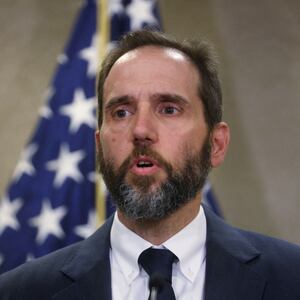A new federal grand jury returned a superseding indictment against former President Donald Trump—charging him with the same four criminal counts related to his alleged attempts to overturn the 2020 presidential election, despite a recent Supreme Court ruling which found that presidents have some immunity from prosecution.
Special Counsel Jack Smith returned the new indictment on Tuesday. The revised charges come only days before the deadline D.C. District Court Judge Tanya Chutkan set for both prosecutors and Trump’s defense attorneys to submit reports on how the July Supreme Court decision would impact the case. The next status conference is currently scheduled for Sept. 5.
Earlier this month, Chutkan rejected a motion from Trump’s defense attorneys to fully dismiss the case.
A new grand jury, who had not previously reviewed the evidence against the former president, charged Trump with conspiracy to defraud the United States, conspiracy to obstruct an official proceeding, obstruction of an official proceeding, and conspiracy against rights—the exact same charges listed in the original indictment handed down in August 2023.
According to a notice filed by Smith on Tuesday, the new indictment “reflects the Government’s efforts to respect and implement the Supreme Court’s holdings and remand instructions in Trump v. United States.”

Donald Trump sits next to his attorney, Todd Blanche, while Special Counsel Jack Smith (left) looks on during a court hearing for the former president, who is accused of orchestrating a plot to try to overturn his 2020 election loss.
JANE ROSENBERG/ReutersIn July, the conservative justices on the high court ruled that former presidents have “absolute immunity from criminal prosecution for actions within his conclusive and preclusive constitutional authority,” as well as “at least presumptive immunity from prosecution for all his official acts.”
The same ruling said that presidents do not have any immunity for “unofficial acts” taken while in office.
The original grand jury indictment was filed last August and included significantly more details about Trump’s alleged conspiracy to overturn the election.
The original 45-page document was reduced down to 36 pages, removing several large pieces of evidence against the former president, primarily an entire section that outlined Trump’s attempts to “leverage the Justice Department” to question the election results. This included allegedly telling the acting Attorney General to “just say that the election was corrupt and leave the rest to me and the Republican congressmen.”
The original section also outlined a long scheme to get the acting Attorney General and acting Assistant Attorney General to sign on to a letter endorsing a plan to force Georgia and other states to submit false slates of electors. The Justice Department officials ultimately did not sign on to the plan.
It also removed some references to the private phone calls Trump made to former Vice President Mike Pence, in which he allegedly “berated” the VP and pressured him to sign on to a plan to decertify the electoral college votes and overturn the results. However, the new indictment still accuses the former president of trying to “enlist” Pence into his scheme without that particular evidence.
In a long statement posted on his Truth Social app on Tuesday, Trump called the new indictment an “act of desperation,” claiming it “has all the problems of the old Indictment, and should be dismissed IMMEDIATELY.”

Special Counsel Jack Smith makes a statement to reporters.
JONATHAN ERNST/ReutersHe accused Smith of being “illegally appointed”—referring to the controversial ruling from Florida District Court Judge Aileen Cannon, the judge overseeing the federal case for Trump's mishandling of classified documents at Mar-a-Lago.
Smith appealed Cannon’s dismissal of the documents case yesterday, noting that her reasoning called into question all of the Justice Department's previous appointments of Special Counsels since the Watergate scandal.
“For them to do this immediately after our Supreme Court Victory on Immunity and more, is shocking,” Trump continued. “I’ve also been informed by my attorneys, that you’re not even allowed to bring cases literally right before an Election – A direct assault on Democracy!”
Later in a separate post, Trump insisted that “it is DOJ policy that the Department of Justice should not take any action that will influence an election within 60 days of that election – but they just have taken such action. Voting starts on September 6th, therefore the DOJ has violated its own policy.”
The Justice Department does have written rules that prohibit employees from taking actions including “investigative steps, criminal charges, or statements, for the purpose of affecting any election, or for the purpose of giving an advantage or disadvantage to any candidate or political party”—though there is no explicit 60-day deadline.
At any rate, Smith’s team submitted the filing 69 days before the presidential election on Nov. 5.
He continued the attack on Smith, as well as Democratic nominee Kamala Harris, who he called on to denounce the Special Counsel's prosecution.
“Smith rewrote the exact same case in an effort to circumvent the Supreme Court Decision. The people of our Country will see what is happening with all of these corrupt lawsuits against me, and will REJECT them by giving me an overwhelming Victory on November 5th for President of the United States….”







